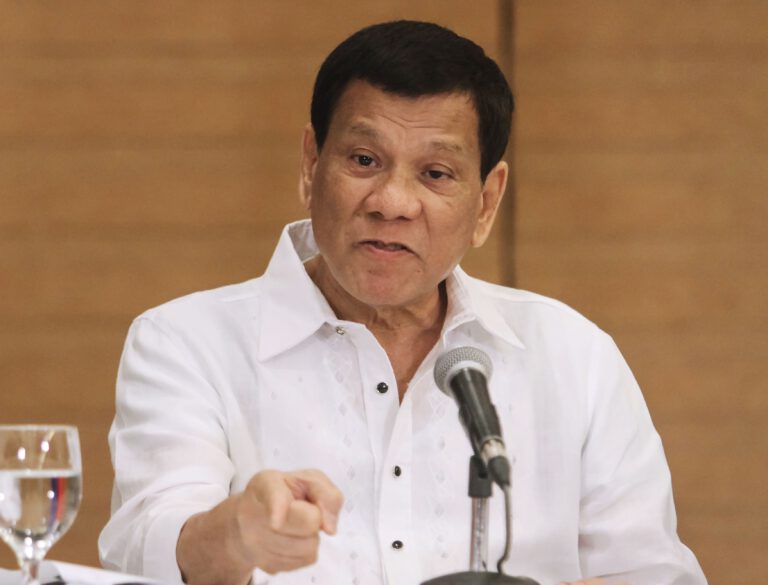
‘By militarizing, terrorizing, and Red-labeling, Duterte hopes to create a climate of fear that would allow him to keep power or pass it on to a trusted successor in order to escape accountability for the crimes of his regime’
Dec 12, 2020, Vergel O. Santos
There’s every reason – much of it clinical, to be sure – to ascribe Rodrigo Duterte’s abnormal or extreme actions to his narcissistic personality and despotic disposition. The danger there lies in missing the method to his madness by taking his actions discretely.
Duterte is definitely no simple case. Not only does his condition transcend the psychological, it affects an entire nation. He happens to be President, and one backed by coopted institutions and enabled by a circle of sycophants similarly afflicted as he or looking to profit for themselves from his gangland-style leadership.
Duterte is not an individual case; he is one whole sick regime. And, if dire surprises are to be avoided, everything he does ought to be taken in that context.
When recently, for instance, Vice President Leni Robredo, whom he has sidelined from his presidency in great fear of her political possibilities, appeared in his hallucination riding a military cargo plane carrying aid to typhoon victims – a case of misappropriation in his presumptuously proprietary view – it did not signify a moment of pique or jealousy; rather, it betrayed a broad-based, farsighted conspiracy.
In fact, the conspiracy also connects to a more revealing, more dangerous, currently running Duterte hallucination – seeing Red everywhere. If the syndrome seems to surprise the communists themselves, it is likely because, in all their 3 quarters of a century of rebellion, they never found a more accommodating President than Duterte.
From the much publicized videophone conversations between the Filipino communist Supremo, Jose Ma Sison, speaking from exile in the Netherlands, and Duterte, calling from Manila at the height of his electoral campaign, their courtship looked hot, indeed. After taking office, President Duterte lost no time in sending off a panel to begin peace talks with Sison and his lieutenants, formally and in person. A diplomatic pivot from the United States, toward China, ideological model to the Philippine communist movement, seemed a nicely added, if vaguely intended, concession. Up to that point, Duterte looked the perfect courter of noble intentions.
Duterte is not an individual case; he is one whole sick regime. And, if dire surprises are to be avoided, everything he does ought to be taken in that context.
Alas, in his godless truth, China is one thing, the local communists another: the first a patron, the second a liability, coming handy only for propaganda. And so, while China continued to exert increasing influence over Duterte, the local communists steadily fell from favor with him.
Unable to get going from fits and starts, the peace talks finally collapsed, early this year, and the communists are on the run again. Duterte won’t be able to catch them, let alone stop them. No President, no one, has been able to, not even his idol, Ferdinand Marcos, with Martial Law.
But subduing the communists is not Duterte’s aim, really; they figure only as a pretextual component of a plot to keep himself in power or, at any rate, immune from retribution. The plot was actually foreshadowed by its two other, substantial, components.
Last July Duterte signed an Anti-Terrorism Act that defines the crime so abstractly one can get into trouble with it on the slightest suspicion. And even much earlier Duterte had begun to recycle newly retired military generals into the bureaucracy – around 60 of them, by one count, now occupy powerful civilian positions.
With a year and a half left of his 6-year term, Duterte must feel so anxious and harried he might settle for anyone he could pass off as a communist. Communist branding has in fact become so indiscriminate you can get it by heredity and other merely fortuitous connections. You become more susceptible if you stand to the left of Duterte’s fascist regime. In the worst case, as in a recent one that recalls his drug war, you could end up dead in your own home in a raid in the dead of night – incontrovertibly pronounced nanlaban.
Duterte has taken to branding even such legitimate players in democratic politics as those rights groups voted to Congress for party-list representation.
As the most familiar certified enemy, communism is worked as a bogey by desperate leaders. It affirms the usefulness of the military and the police. In Duterte’s regime particularly, it also makes them feel worthy of their doubled salary and his promise to protect them from prosecution.
By militarizing, terrorizing, and Red-labeling, Duterte hopes to create a climate of fear that would allow him to keep power or pass it on to a trusted successor in order to escape accountability for the crimes of his regime. Nothing is either new or unique in that strategy. But it held for Marcos – for 14 years. – Rappler.com